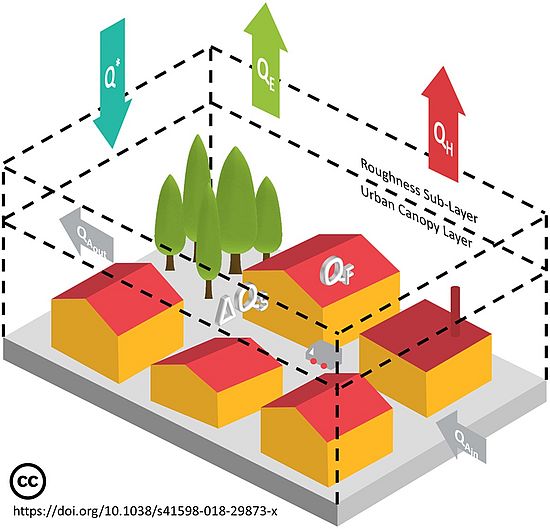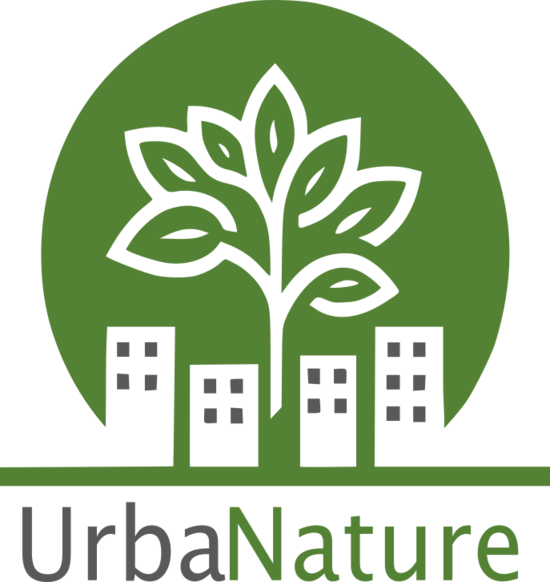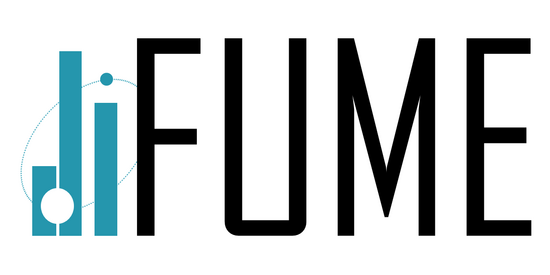Surface energy balance and greenhouse gas exchanges over urban areas
Our group operates urban micrometeorological towers in Basel since 1992, offering unique long time-series datasets of measured surface energy and CO2 fluxes. We develop and apply new methodologies to characterize the spatiotemporal patterns of energy and CO2 fluxes in the heterogeneous urban environment, detecting long-term trends and identifying the contributions from biospheric and anthropogenic components. Our methodologies involve the combined use of in-situ observations (i.e. Eddy Covariance, radiation balance, meteorology), remote sensing data and analytical modeling (e.g. empirical and process-based models of biospheric and anthropogenic flux processes).

Responsible team members
Related projects

UrbaNature is funded by MeteoSwiss within the framework of Switzerland’s Global Climate Observing System and Global Atmosphere Watch programmes (GAW-CH, GCOS-CH). The project targets to create new knowledge and develop new methodologies on observing and simulating the role of vegetation in carbon, energy, and water cycles in the urban environment.
Duration: 2023 - 2027

ICOS Cities (PAUL – Pilot Applications in Urban Landscapes) is a Horizon 2020 project that aims to develop a systematic greenhouse gas measurement system for urban areas. COS Cities will bring together and evaluate the most innovative measurement approaches of greenhouse gas emissions in densely populated urban areas. The project supports the European Green Deal and aims at developing useful tools and services for cities in support of their local climate action plans. https://www.icos-cp.eu/projects/icos-cities-project
Duration: 2022 - 2025

diFUME is a project funded by the European Union’s Horizon 2020 research and innovation programme under the Marie Sklodowska-Curie Individual Fellowships grant. diFUME is developing a methodology for mapping and monitoring the urban carbon dioxide flux at optimum spatial and temporal scales, meaningful for urban design decisions. https://mcr.unibas.ch/difume/
Duration: 2019 - 2021

CURE is an EU-funded H2020-Space project that synergistically exploits the Copernicus Core Services and develops a system for urban resilience in DIAS (Data and Information Access Services), consisting of cross-cutting applications for climate change adaptation/mitigation, energy and economy, as well as healthy cities and social environments, concerning several European cities. http://cure-copernicus.eu/
Duration: 2018 - 2022
Key publications
Stagakis, S., Feigenwinter, C., Vogt, R., Kalberer, M., 2022. A high-resolution monitoring approach of urban CO2 fluxes. Part 1 - bottom-up model development. Sci. Total Environ. 160216. https://doi.org/10.1016/J.SCITOTENV.2022.160216
Nicolini, G., Antoniella, G., Carotenuto, F., Christen, A., Ciais, P., Feigenwinter, C., Gioli, B., Stagakis, S., Velasco, E., Vogt, R., Ward, H.C., Barlow, J., Chrysoulakis, N., Duce, P., Graus, M., Helfter, C., Heusinkveld, B., Järvi, L., Karl, T., Marras, S., Masson, V., Matthews, B., Meier, F., Nemitz, E., Sabbatini, S., Scherer, D., Schume, H., Sirca, C., Steeneveld, G.J., Vagnoli, C., Wang, Y., Zaldei, A., Zheng, B., Papale, D., 2022. Direct observations of CO2 emission reductions due to COVID-19 lockdown across European urban districts. Sci. Total Environ. 830, 154662. https://doi.org/10.1016/j.scitotenv.2022.154662
Stagakis, S., Chrysoulakis, N., Spyridakis, N., Feigenwinter, C., Vogt, R., 2019. Eddy Covariance measurements and source partitioning of CO2 emissions in an urban environment: Application for Heraklion, Greece. Atmos. Environ. 201, 278–292. https://doi.org/10.1016/j.atmosenv.2019.01.009
Chrysoulakis, N., Grimmond, S., Feigenwinter, C., Lindberg, F., Gastellu-Etchegorry, J.P., Marconcini, M., Mitraka, Z., Stagakis, S., Crawford, B., Olofson, F., Landier, L., Morrison, W., Parlow, E., 2018. Urban energy exchanges monitoring from space. Sci. Rep. 8, 11498. https://doi.org/10.1038/s41598-018-29873-x
Feigenwinter, C., Vogt, R., Parlow, E., Chrysoulakis, N., Lindberg, F., Maconcini, M., Del Frate, F. (2018): Spatial Distribution of Sensible and Latent Heat Flux in the city of Basel (Switzerland). IEEE J-STARS, 11 (8), 2717-2723, https://doi.org/10.1016/j.jaridenv.2020.104260
Wicki A, Parlow E, Feigenwinter C. (2018): Evaluation and Modeling of Urban Heat Island Intensity in Basel, Switzerland. Climate, 6(3),55. https://doi.org/10.3390/cli6030055
Quick Links
Social Media
